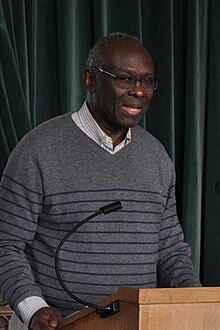Lamin Sanneh
| Lamin Sanneh | |
|---|---|
 |
|
| Born | 1942 (age 74–75) Gambia |
| Occupation | Scholar of missions and religious studies |
| Known for | History of the African Christianity and a pioneer in the academic field of world Christianity |
| Spouse(s) | Sandra Sanneh |
| Academic work | |
| Discipline | Missiology, religious studies |
| Institutions | University of Ghana, University of Aberdeen, Harvard, Yale University, Yale Divinity School |
Lamin Sanneh (born 1942) is the D. Willis James Professor of Missions and World Christianity at Yale Divinity School and Professor of History at Yale University.
Sanneh was born and raised in Gambia. After studying at the University of Birmingham and the Near East School of Theology, Beirut, he earned his doctorate in Islamic History at the University of London. Since then, he has written many books and articles on the relationship between Islam and Christianity (titles include Faith and Power: Christianity and Islam in “Secular” Britain, The Crown and the Turban: Muslims and West African Pluralism, and Piety and Power: Muslims and Christians in West Africa). Sanneh converted to Christianity from Islam and is now a practicing Roman Catholic.
Another major area of Sanneh's academic work is in the study of World Christianity. He writes extensively about the translation of the Christian message, challenging a good deal of the accepted history of mission in the modern academy. In his 1989 Translating the Message, he writes:
In time, Christianity expanded from Europe into Asia and Africa, among other places, and was able to break out of its Western cultural confinement by repeating the process by which the church's missionary center shifted from Jerusalem to Antioch and beyond. In some important respects, however, the modern shift was unprecedented, for it was the extraordinary multiplicity of mother-tongue idioms that became the subject of Christian mission rather than the cosmopolitan values of an ascendant West. Nonetheless, mission maintained continuity with its apostolic past. In examining the modern missionary phase, however, we should highlight important signposts in the indigenous culture, especially in the local encounter with the modern West. The translation role of missionaries cast them as unwitting allies of mother-tongue speakers and as reluctant opponents of colonial domination.
...
Wikipedia
